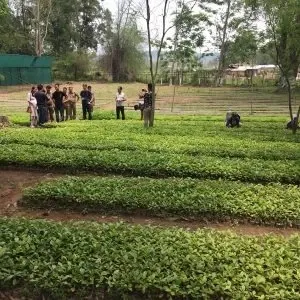Does Nagaland Hold the Key to Expanding Coffee Plantations Over 10 Lakh Hectares?

Synopsis
Key Takeaways
- Nagaland's coffee potential spans over 10 lakh hectares.
- Partnership with the Coffee Board aims to revitalize coffee production.
- Farmers are encouraged to focus on organic coffee cultivation.
- Addressing the Naga political issue is crucial for attracting investment.
- Training and support for farmers are vital for success.
Kohima, Sep 3 (NationPress) Chief Minister Neiphiu Rio of Nagaland stated on Wednesday that with the return of the Coffee Board and its collaboration with the Department of Land Resources to rejuvenate coffee cultivation, the state is poised to significantly boost its coffee production. He highlighted the potential for coffee plantations across more than 10 lakh hectares.
During the 219th Coffee Board Meeting held in Kohima, the Chief Minister emphasized that successful coffee farming could align with the vision of 'Viksit Bharat 2047', transforming coffee into a hallmark of Nagaland.
He remarked that coffee cultivation in Nagaland began in the 1980s, supported by the Coffee Board, but faltered due to mismanagement rather than farmer negligence.
Rio also pointed out that Nagaland's farmers are capable of producing a variety of exotic fruits, including avocados, persimmons, kiwis, dragon fruits, and pineapples.
Additionally, he raised concerns about the lingering Naga political issue, which has deterred investors from various industries in the state. He referenced the Nagaland Paper Mill’s unsuccessful partnership with Hindustan Paper, which left bamboo resources to decay.
He noted that the sugar mill in Dimapur is struggling due to space constraints for sugarcane cultivation. Despite the local availability of raw materials, he warned that it might take time for industries to establish themselves in the state, especially as imports face challenges of quality and price competition.
Rio asserted that, in the absence of industries and imports, farmers must leverage their land for coffee production, focusing on organic methods, since the state prohibits fertilizers.
He urged Coffee Board members to conduct field visits, engage with farmers, provide essential training for high-quality coffee cultivation, and supply nursery materials.
The meeting was led by Coffee Board CEO/Secretary Kurma Rao M. The members are set to engage with various stakeholders and visit coffee farms during their three-day stay in the state.










